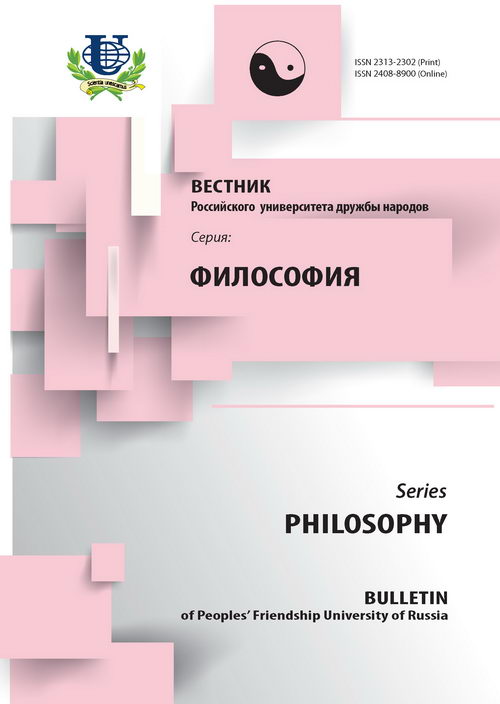No 3 (2014)
- Year: 2014
- Articles: 18
- URL: https://journals.rudn.ru/philosophy/issue/view/699
Articles
Editorial note
RUDN Journal of Philosophy. 2014;(3):5-6
 5-6
5-6


Genealogical approach to the history of philosophy
Abstract
The article presents a genealogy as a way of the historic-philosophic reconstruction correlating with the method of the classic historicism. The genealogical approach applied to the problem of a national philosophy gives an opportunity to define concretely the processes of its beginning & formation.
RUDN Journal of Philosophy. 2014;(3):7-13
 7-13
7-13


To the concept of the ideal state of Ibn Rushd
Abstract
This article is an attempt to reconstruct a model of the ideal state of Ibn Rushd on the material of his work “Al-Talhis siyasah” by analyzing this medieval text, through the consideration of options for the political structure of the state, described the Arab philosopher, as well as through the analysis of some of the terminology concepts as arkhe (Greek) - [ri'-asa] (Arabic), Logos - ['aql], Psyche - [nafs], Arete - [fadilah], Sophia - [hikma].
RUDN Journal of Philosophy. 2014;(3):14-24
 14-24
14-24


Perfect man in the Sufi philosophy Abd al-Karim al-Jili
Abstract
The main objective of this research is to study and analyze the views of Abd al-Karim al-Jaili about the philosophy of human perfection in his philosophy. Hence, the research mainly deals with the issue of his mystical philosophy of Perfect Man.
RUDN Journal of Philosophy. 2014;(3):25-35
 25-35
25-35


The confucian mentor, who founded the state
Abstract
The article reveals the importance of Gu Yanwu’s philosophical views, influenced the ideology of statism and patriotism. Gu Yanwu is a famous Chinese patriot and mastermind of the early Qing Confucianism, formed the image of Manchu empire. Particular attention is paid to the review of his texts, included into the complete set of works, published in 2011 in China.
RUDN Journal of Philosophy. 2014;(3):36-44
 36-44
36-44


“Zi yi” (“The black robes”): two versions of one text
Abstract
The article analyze the Early Chinese text “Ziyi” (“The black robes”) and show the differences among two extant versions of this text, one the manuscript version of the Guodian (date the end of the Zhanguo period) and second received version in the canonical text of “Li ji” (“Records of rites”) (date the beginning of the Han dynasty). These differences will illustrate evolution of the Confucian’s study and Early Confucian’s philosophical thought.
RUDN Journal of Philosophy. 2014;(3):45-55
 45-55
45-55


 56-61
56-61


 62-74
62-74


 75-87
75-87


Philosophy of pedagogy and education of M.M. Rubinshtein
Abstract
In the article analyzes interference of philosophy and pedagogics on an example of M.M. Rubinstein’s (1878-1953) creativity. He developed idea of the integral person, importance of recognition absolute as values in pedagogical education, criticized aesthetic immoralism. As a matter of fact Rubinstein developed personalistic Platonism, solving a task on constructing system of philosophical pedagogics, personalistic philosophies of upbringing and education .
RUDN Journal of Philosophy. 2014;(3):88-92
 88-92
88-92


Do is it necessary to resist to the evil by force? (on the foundation of humanistic policy)
Abstract
In this research reveals possible variants of the correlation between violence and nonviolence in politics: especially Machiavelli's idea ( only the good political end justifies any means ), Machiavellianism ( the end justifies any means ), humanistic ( the good end can be achieved only by good methods ), and pacifist ( non-resistance to evil by force - L. Tolstoy) concepts. The basic difference between the specified variants of understanding the correlation between morality and politics in humanistic and pacifist version is established. In the article stresses that the pacifist non-resistant variant is immoral. Asserts that global problems, both international and domestic ones, can be solved only based on the humanistic nonviolence policy: nonresistance to evil by violence , which does not exclude resistance to evil by force and sometimes even requires it. Its principles revealed in the “axial time” suggested by the world religions and philosophy and developed by I. Kant, F. Dostoevsky, M. Gandhi, M.L. King, etc.
RUDN Journal of Philosophy. 2014;(3):93-101
 93-101
93-101


 102-114
102-114


“True being” of Parmenides: a logical analysis
Abstract
The article analyzes the central concept of Parmenides’ ontology - the one of being. One of the possible interpretations for it is to understand it as a law of identity. But there are a few ways of representing the law. In the article they are examined and compared. The interpretation of the law is proposed which goes with such properties of being as conceivability and uniqueness.
RUDN Journal of Philosophy. 2014;(3):115-119
 115-119
115-119


Latin-American civilization version. Part 2. From the beginning of continent colonisation to XX century
Abstract
The self-identification models building process is being considered upon the examples of border civilizations in their complicity and specifics, and relation to historical and cultural contexts. The author reveals the essence of America and its people in two prospectives: external European and internal, proceeding from the core of the american reality.
RUDN Journal of Philosophy. 2014;(3):120-134
 120-134
120-134


Hu Shih about history of philosophy as philosophical discipline
RUDN Journal of Philosophy. 2014;(3):135-143
 135-143
135-143


Violence - the dialectic of subjective and objective
RUDN Journal of Philosophy. 2014;(3):144-150
 144-150
144-150


The concept of synthesis of Protestantism and capitalism in the book S. Bulgakov “History of economic and social teachings”
RUDN Journal of Philosophy. 2014;(3):151-155
 151-155
151-155


On Our Authors
RUDN Journal of Philosophy. 2014;(3):156-157
 156-157
156-157
















